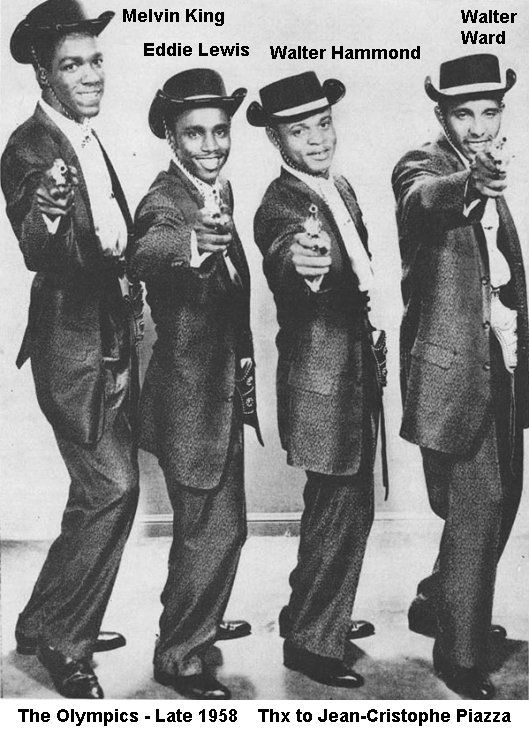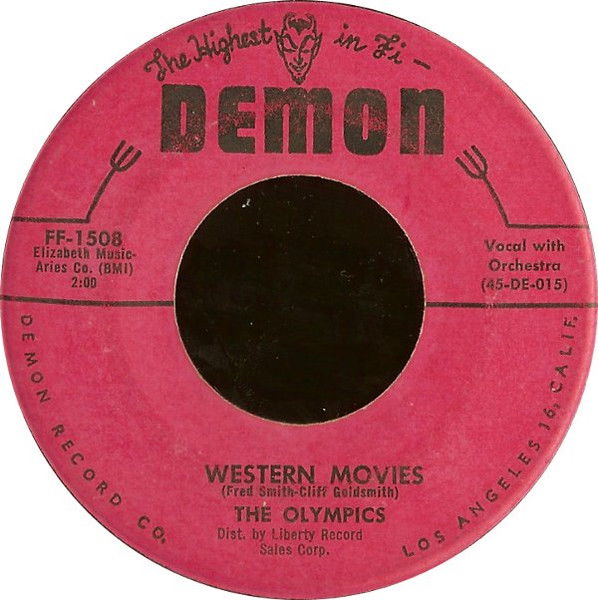THE OLYMPICS

The Olympics were one of the few 1950s vocal groups who stayed on the charts well into the ‘60s.
Walter Ward was born in Mississippi on August 28, 1940. He, his father and three uncles sang gospel as the Ward Brothers. The family relocated to Los Angeles in the early ‘50s. There, Ward hung out with his cousin from Mississippi, Eddie Lewis. When they entered high school in 1954, they assembled a Rhythm and Blues group called the Challengers. At a talent show, the Challengers met Charles Fizer and Walter Hammond, with whom Lewis and Ward joined forces, forming a new line-up.
In 1956, the group appeared on a local TV show, the result of which was that they were offered a recording contract with the Melatone label. This produced the single, “I Can Tell” / “The Mambo Beat,” under the name Walter Ward & The Challengers. When it came to their attention that there was already a Challengers group, they re-dubbed themselves the Olympics. After their one Melatone release, the group did not record again for two more years.
In 1958, R&B singer Jesse Belvin introduced the Olympics to John Criner. He became their manager and got the group signed to Demon Records. The label’s A&R men, Cliff Goldsmith and Fred Smith, had co-written a novelty song called “Western Movies,” which they had the Olympics record. The single quickly took off, going top ten both on the R&B and pop charts in the summer of 1958. Shortly after their debut hit, Charles Fizer left the group. His replacement was Melvin King, who would stay with the Olympics for the next seven years.
In 1959, Fred Smith and Cliff Goldsmith left Demon for Arvee Records. The Olympics went with them. Not longer after, Walter Hammond quit the group and was succeeded by Thomas Busch, who appeared on just one single, “(Baby) Hully Gully.”
Next, Eddie Lewis and a returning Charles Fizer sang a dual lead on “Big Boy Pete.” Released in the spring of 1960, it became their biggest hit since “Western Movies.” (In 1965, the Kingsmen “borrowed” the song’s melody for their own hit, “The Jolly Green Giant.” “Big Boy Pete” also inspired Jim Croce to write “Bad, Bad Leroy Brown.”)
The Olympics remained with Arvee through 1962, by which time they had released three LPs and many singles, some of which made the national charts. They then turned to local record man Sy Aronson, who signed them to his Tri-Disc label. Their first release on it, “The Bounce,” became their second biggest hit, reaching #22 R&B and #40 pop in early 1963.
In late 1964, the Olympics parted ways with Aronson to sign with Warner Brothers. Their March 1965 release on the Loma subsidiary, “Good Lovin’,” only reached #81 but would become a #1 hit for the Young Rascals a year later.
On August 14, 1965, Charles Fizer was shot to death during the Watts riots. When Melvin King’s sister was killed the same day, he left the group for good. Walter Ward and Eddie King hired a new member, Mack Starr, reducing the Olympics to a trio. By 1966, they were on Mirwood, for whom they recorded a pair of singles that grazed the national charts.
The group continued into the ‘70s, releasing commercially unsuccessful singles on labels like Parkway, Jubilee, Warner Brothers, Songsmith, Pride, MGM, Little Star, and California Gold. In June 1981, Mack Starr was killed in a motorcycle crash. He was replaced by bass man William DeVase. With a fourth member, Kenny Sinclair, this line-up of Olympics lasted until March 2003, when Sinclair died.
Walter Ward himself passed away on December 11, 2006, William DeVasse in May 2009. Eddie Lewis kept the group going as a trio with Vel Omarr and Alphonso Boyd until his own death on May 31, 2017.
Charted singles:
“Western Movies” (1958) R&B #7, Pop #8
“(I Wanna) Dance With the Teacher” (1958) Pop #71
“Private Eye” (1959) Pop #95
“(Baby) Hully Gully” (1959) Pop #72
“Big Boy Pete” (1960) R&B #10, Pop #50
“Shimmy Like Kate” (1960) Pop #42
“Dance by the Light of the Moon” (1960) Pop #47
“Little Pedro” (1961) Pop #76
“Dooley” (1961) Pop #94
“The Bounce” (1963) R&B #22, Pop #40
“Dancin’ Holiday” (1963) Pop #86
“Good Lovin’” (1965) Pop #81
“Mine Exclusively” (1966) R&B #25, Pop #99
“Baby, Do the Philly Dog” (1966) R&B #20, Pop #63
Other worthwhile recordings by the Olympics include “Your Love” (1959), “The Slop” (1960), “Raining in My Heart” (1965), “I’ll Do a Little Bit More” (1966), and “Lookin’ for a Love” (1968).

